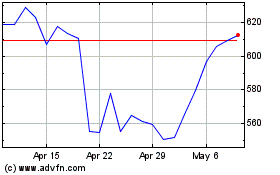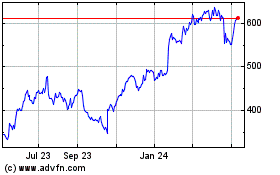Rule Change May Help Online TV -- WSJ
July 09 2018 - 3:02AM
Dow Jones News
By Michael Rapoport
This article is being republished as part of our daily
reproduction of WSJ.com articles that also appeared in the U.S.
print edition of The Wall Street Journal (July 9, 2018).
Is it a TV show or a really long movie? In the streaming,
binge-watching era, the line between the two has gotten blurry --
and that could eventually help nudge earnings upward at companies
like Amazon.com Inc. and 21st Century Fox Inc.
Accounting rule makers have tentatively agreed that companies
should account for their costs of producing TV shows in the same
way that movie production costs are already handled. Right now, TV
producers have to immediately expense many of those costs, cutting
into profits; moviemakers can bleed them into results over
time.
The difference between shows and movies "is no longer as
relevant" for purposes of gauging companies' finances, said Jason
Bond, coordinator of the Emerging Issues Task Force, a part of the
Financial Accounting Standards Board. The group decided upon the
change last month.
If the change is ultimately enacted by the full FASB, TV
producers could record profits more quickly than they do now.
Mr. Bond said the impact will vary among companies. But in a
market where TV producers are in an arms race, spending billions of
dollars on original content, any additional lift to their profits
could be important.
Under current rules, companies that make movies can fully
"capitalize" their production costs -- they are placed on the
balance sheet and filtered into earnings over time instead of being
recognized in earnings all at once.
That isn't always the case for companies that make TV shows --
often housed within companies that also have units making movies.
TV show makers can only capitalize a portion of their expenses,
while the rest are charged to current earnings. The only production
costs they can capitalize are those they can show are matched by
revenue they have contracted for, or by future revenue from other
markets like syndication or DVD sales.
The arrangement made sense when the current rules were
formulated back in 2000. Back then, all TV shows were released one
episode at a time, often on platforms that the producing company
didn't control, and there was a big risk a show could flop and be
canceled quickly, making it harder for the producer to make back
what it had spent. So limiting the degree to which companies could
capitalize their costs seemed appropriate.
Today, streaming-TV companies often put out all episodes of a
show at once, like a movie, on their own platform. There are new TV
business models, like subscriptions. The avenues for distributing
TV shows have mushroomed.
All that made TV production less of a crapshoot. It also left
accounting rule-makers questioning whether there was any point to
continue drawing a distinction between TV and movie production, Mr.
Bond said.
Last month, the FASB task force, which handles new and
specialized accounting issues, tentatively decided all production
costs could be capitalized, whether for movies or TV shows. For
companies that currently expense some of their costs, that could
mean they will record lower current expenses, boosting earnings,
although the capitalized costs will ultimately be reflected in
earnings down the line.
The proposed changes will ultimately have to be approved by the
full FASB, and wouldn't take effect until some point in the
future.
Not all TV producers will necessarily benefit. Netflix Inc., for
one, said in its annual report that it already capitalizes
production costs for its original productions. Netflix couldn't be
reached for comment.
Amazon, which has become a major force in streaming original TV
shows, has indicated it does count some of its production costs
against current earnings. The company said in its annual report its
capitalization of those costs is limited, and so some of them are
expensed as they are incurred. An Amazon spokeswoman declined to
comment.
Similarly, 21st Century Fox said in its annual report that TV
production costs "incurred in excess of the amount of revenue
contracted for each episode in the initial market are expensed as
incurred on an episode-by-episode basis." A Fox spokeswoman
declined to comment. 21st Century Fox shares common ownership with
News Corp., the parent company of The Wall Street Journal.
Write to Michael Rapoport at Michael.Rapoport@wsj.com
(END) Dow Jones Newswires
July 09, 2018 02:47 ET (06:47 GMT)
Copyright (c) 2018 Dow Jones & Company, Inc.
Netflix (NASDAQ:NFLX)
Historical Stock Chart
From Mar 2024 to Apr 2024

Netflix (NASDAQ:NFLX)
Historical Stock Chart
From Apr 2023 to Apr 2024
